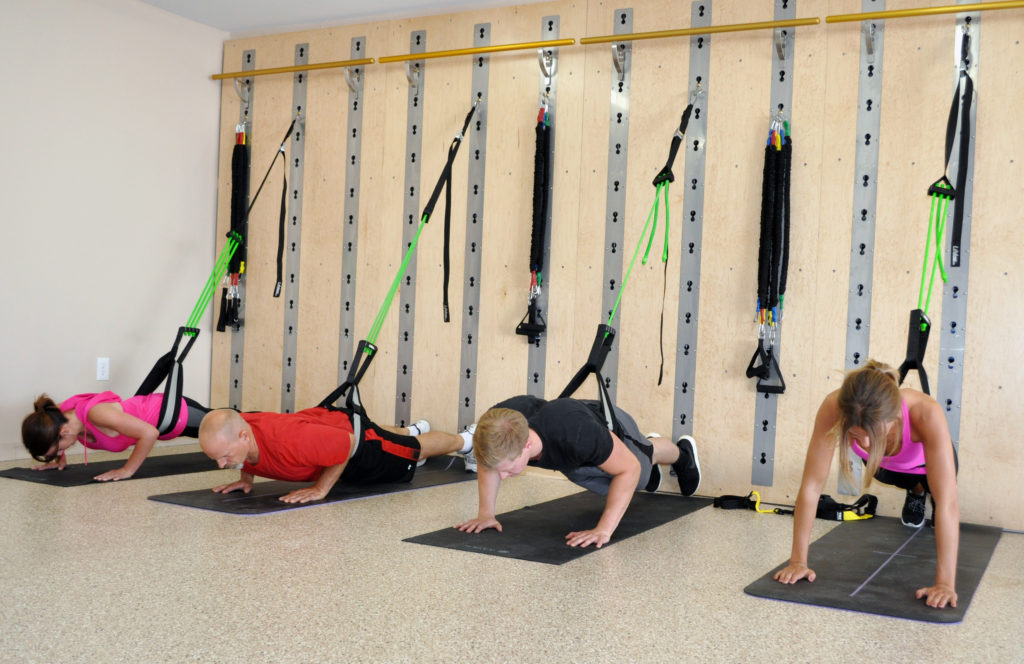Are You Damaging Your Shoulders With Your Chest Workouts?

Chest presses can encompass a wide variety of exercises utilizing dumbbells, machines, barbells, and bands, as well as various body-weight exercises. As the name implies these exercises can be a great way to build up the chest muscles, although they do utilize other muscles as well. Here I want to take a look at a few principals to keep in mind when doing chest press type exercises if you have shoulder problems, or are simply seeking to keep your shoulders in good functional condition.
When most people engage in chest press exercises, they pay little or no attention to the fact that the muscles in and around the shoulder will be working to stabilize the head of the humerus in what is known as the Glenohumeral joint. To what degree the muscles of the shoulder have to work to properly perform this stabilization depends in large part on the type of chest press exercises.
Chest press exercises that are machine oriented typically require minimal work for the shoulder muscles to stabilize the Humerus. Since the range and movement allotted on the machine are all controlled, the shoulder muscles work less, and the pectoral and triceps muscles typically do more. This can be very useful for people trying to focus on building up the size of the chest muscles, especially if past shoulder problems seem to get aggravated by non-machine chest press exercises.
The downside to chest press machines is that you may pull in less actual muscle fiber during the movement. This is because your muscles are pushing through the exact same range of motion every time you do the press. When people do a free weight bench press, there is variation on every repetition. The variation in the motion may be less than an inch. It may even be measured in millimeters. The point however is that the chest muscles work a bit harder and pull in more muscle fibers to do that work as the lifter pushes through these minor deviations in the movement with each repetition. This is one of the reasons you won’t see many bodybuilders only doing machine chest press exercises.
Doing chest presses with dumbbells places even more requirements on the shoulders. The variability in movement allowed is even higher than it is when using dumbbells. This necessitates even greater stability on the part of the shoulder, which can consequentially aggravate any existing shoulder problems.
For some lifters, bringing the elbows in closer to the side, or to about 45 degrees out to the side will help in alleviating shoulder pain when doing dumbbell chest presses. In many cases however, dumbbell chest presses are just not the best way to go if you have shoulder problems. Not only do they require more work by the various shoulder muscles involved, but the very reason that lifters love dumbbell chest presses (increased range of motion) makes them even harder on the shoulder.
As a lifter lowers dumbbells to the bottom of the range of motion, he will feel a great stretch across the chest that won’t be possible with the standard bench press or most machines. This stretch and increased range of motion that is a hallmark of dumbbell chest presses is the very thing that puts a great deal of strain on the anterior (front) of the shoulders. This combined with the stabilization requirements should give anyone exhibiting shoulder problems reason to consider other chest exercises besides dumbbell chest presses.
If you’re having ongoing shoulder problems it’s a good idea to meet with an orthopedic doctor. If your doctor determines you have no major issues, then strengthening the deltoids, rotator cuff muscles, and surrounding muscles is imperative to your long term lifting success.
At Isawall we have built into our system dozens of exercises that can be done easily and conveniently in the comfort of your home, office, or workout facility. Because shoulder problems and injuries are so common, it’s important to take the time regularly to work the various shoulder muscles imperative to proper shoulder movement and biomechanics. Talk to one of our associates to see how Isawall can help you maintain maximum shoulder function and performance both in your workouts and daily life.

Paul Owens is a personal trainer in the Cleveland area. He is a Certified Personal Trainer through the National Strength and Conditioning Association, and the National Council on Strength and fitness. He is also a Corrective Exercise Specialist through the National Academy of Sports Medicine. He can be reached at http://www.clevelandpersonaltraining.com





